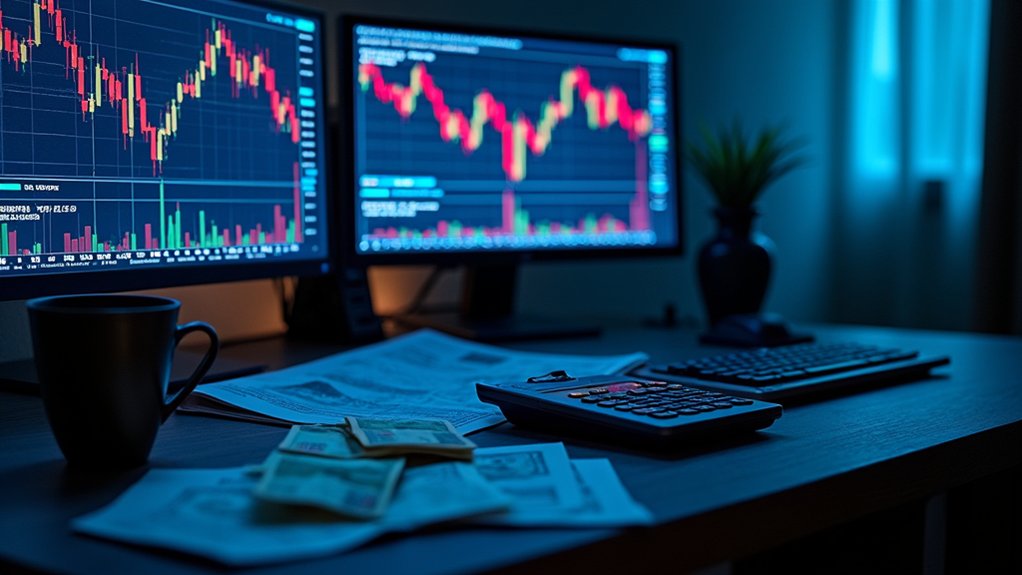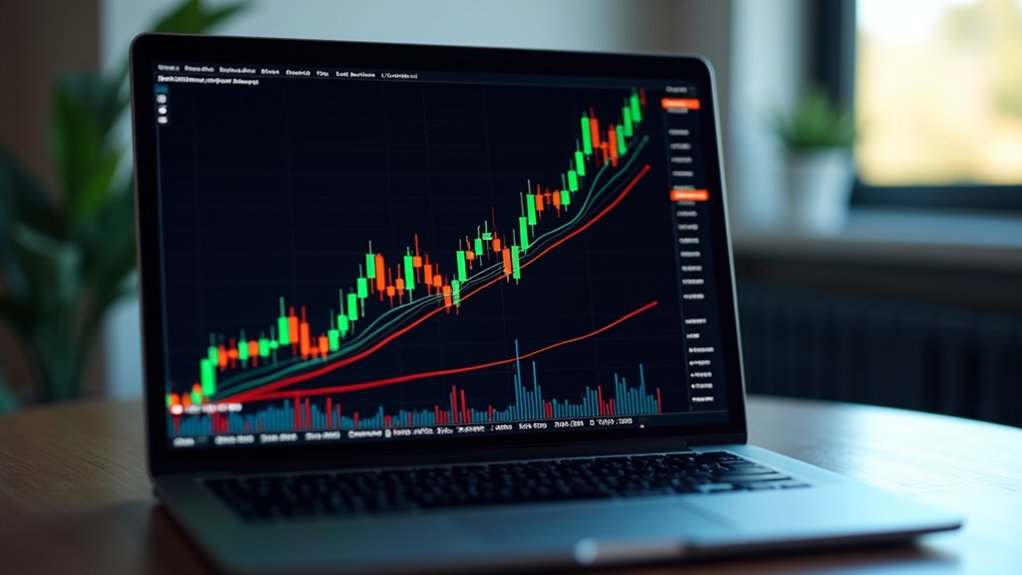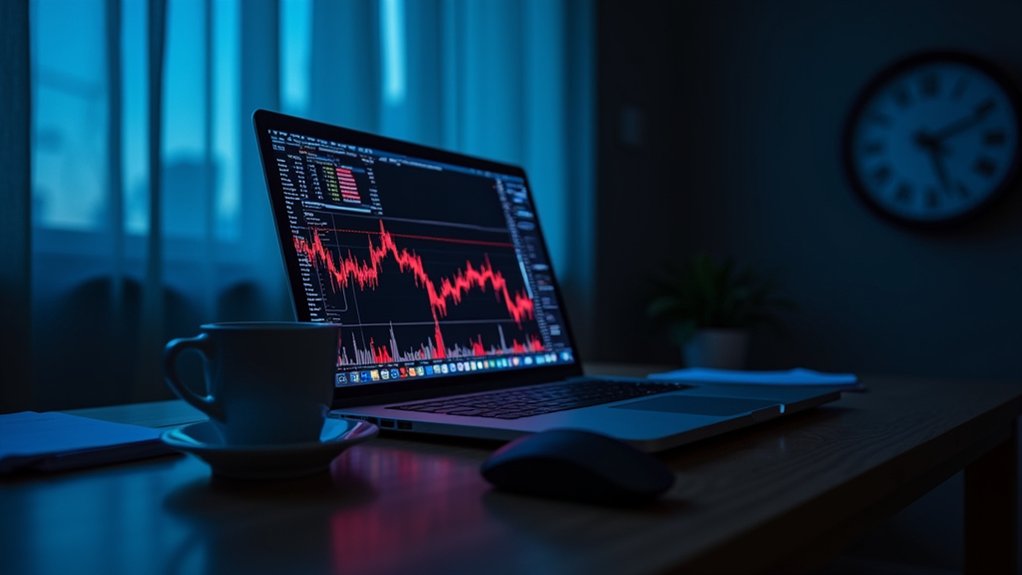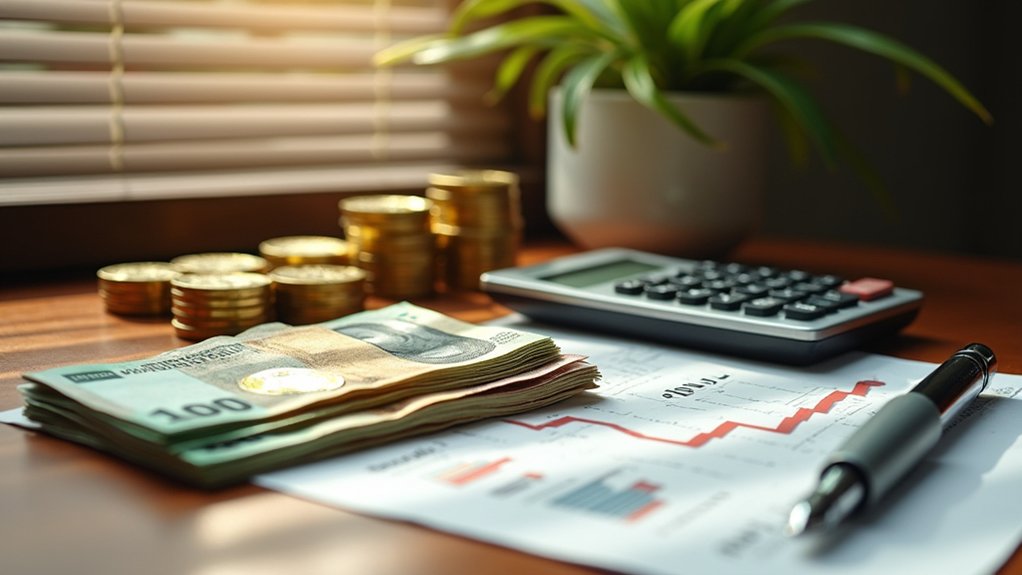Yes, people make money trading forex—but only about 15% of retail traders turn any net profit at all. The odds get uglier over time: 23% stay profitable after twelve months, then just 1% make it past five years. Professionals with deep pockets and AI tools can pull 8–22% annually, while successful retail traders earning $10,000+ monthly combine serious capital, years of experience, and iron discipline. The market's global $9.6 trillion daily volume doesn't change the brutal math for most participants.

Forex trading sounds like a golden ticket—until you look at the numbers. The global forex market hit $9.6 trillion in daily volume by April 2025, up 28% from $7.5 trillion three years earlier. It's massive. It's liquid. And for most people trying to crack it? It's a fast track to disappointment.
The forex market's $9.6 trillion daily volume looks impressive until you face the brutal reality most traders lose.
Only about 15% of forex traders make any net profit at all. Let that sink in. Roughly 23% of active retail traders stay profitable after 12 months, but the attrition is brutal. Day traders? They've got a 13% chance of staying consistent over six months. At the five-year mark, that drops to 1%. One percent. The odds are not in your favor.
For African traders, the picture gets more complicated. Sure, emerging market currency activity—including from Africa—helped fuel that surge in global volume. But access isn't equal. Traders in Nigeria, Kenya, South Africa, and Egypt face broker restrictions, currency controls, and internet reliability issues that traders in London or New York never think about. Volatility in pairs like USD/ZAR or USD/NGN can create opportunities, but also whiplash losses when local economic or political shocks hit. And forget tight spreads on exotic African pairs—liquidity dries up fast.
The global stats focus on major pairs: EUR/USD, USD/JPY, GBP/USD. These account for the lion's share of volume and offer the tightest spreads. EUR/USD alone takes up 20–23% of daily trading. Institutional traders pulling 8–22% annual returns? They're trading these pairs with deep pockets, advanced AI analytics, and automated systems. The successful retail trader earning $10,000+ a month? They've got substantial capital, years of experience, and iron discipline. Increased liquidity in 2025 has resulted in tighter spreads, reducing trading costs for those who can access premium platforms.
Most beginners don't. They chase quick wins with high leverage, which amplifies losses just as fast as gains. Emotional decision-making and overtrading finish the job. Lack of education and unrealistic expectations seal the deal. The vast majority can't break even, let alone sustain profits beyond five years. For part-time traders, systematic approaches consistently outperform discretionary methods, even when time is limited. The psychological challenges of managing fear and greed under pressure often derail even traders with solid technical knowledge.
Technology helps—AI-driven platforms, big data, automated trading—but only if you know what you're doing. Multi-asset strategies mixing currencies with digital assets or CBDCs open new doors, but they require skill. Specializing in specific pairs and sticking to proper risk management improves your odds, but there are no guarantees. Pairs like USD/JPY saw directional moves from 146 to around 153–154, driven by U.S. higher rates versus the BOJ's ultra-loose policy—the kind of policy divergence that creates real opportunities for traders who understand central bank dynamics. Behind every price movement are central banks and commercial banks executing massive orders that dwarf retail volume. Professional traders who do succeed typically focus on income ranges between $5,000 and $30,000 monthly, depending on capital and market conditions.
Can you make money on forex? Yes. Will you? Probably not. The market doesn't care about your dreams. It's cold, indifferent math. In South Africa specifically, traders must navigate FSCA regulations and choose platforms that comply with local legal requirements to avoid broker scams and legal issues. And for traders across Africa maneuvering additional barriers, the reality is even harder.
Common Questions
Which African Currencies Are Easiest to Trade for Beginners?
The South African Rand (ZAR) and Nigerian Naira (NGN) dominate beginner accessibility across the continent. USDZAR ranks among the most traded pairs, with brokers like FBS accepting ZAR deposits starting around R100.
Nigerian traders work through CBN-regulated brokers offering NGN accounts on MetaTrader platforms. Both currencies offer competitive spreads and local regulatory frameworks—critical for beginners who'd rather not navigate currency conversion headaches or sketchy offshore brokers with zero accountability.
How Do Internet Outages Affect My Open Trades in Nigeria or Kenya?
Internet outages lock traders out completely. In Nigeria or Kenya, when service drops, positions sit unmonitored—no stop-loss adjustments, no exits, nothing.
Kenya lost 511 hours of connectivity in 2024, costing $75 million. AWS outages in 2025 froze logins and order updates across both countries. Undersea cable cuts hit Kenya, Uganda, Rwanda simultaneously.
Traders can't close losing trades during government shutdowns or infrastructure failures. Market moves keep happening. Accounts don't pause. Risk just sits there, accumulating.
Can I Trade Forex Legally in Algeria or Ethiopia?
Forex trading is legal in Algeria but locked down tight. The Bank of Algeria runs a strict show—heavy capital controls, limited broker access, taxes on profits.
Ethiopia? Murkier. No explicit ban, but the National Bank of Ethiopia keeps foreign exchange on a short leash. Access to international brokers is restricted, regulations are vague, and the economic climate is shaky.
Both countries allow trading in theory. In practice? It's a bureaucratic obstacle course with serious legal and financial constraints.
What Minimum Deposit Do South African Brokers Require for Real Accounts?
South African brokers don't all demand hefty opening balances. Some require nothing upfront—Fusion Markets leads that pack for 2025. Others set minimums ranging from $10 to $200, depending on account type and leverage.
Local platforms tied to Johannesburg or Cape Town might ask for ZAR equivalents, usually between R500 and R3,000. It varies widely.
The point? Shop around. Zero-deposit accounts exist, but they're not everywhere, and conditions always apply.
Do Mobile Money Platforms Work for Depositing Funds With Forex Brokers?
Yes, they do. Brokers like XM, Exness, CMTrading, Tickmill, and AXI accept mobile money deposits across Africa. M-Pesa, MTN Mobile Money, Airtel Money, and EcoCash are commonly supported.
Deposits process instantly or within minutes, starting from $5 to $200 minimum depending on the broker. It's a game-changer for traders without bank accounts.
Just verify if your broker allows withdrawals too—not all do, which matters.










